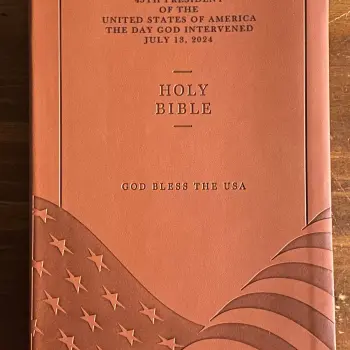Recently, a group of Israeli Jewish lobbyists have been trying to get the Knesset for the first time to declare Israel “a Jewish state.” And Israel’s Prime Minister Benjamin Netanyahu is demanding that in the U.S.-brokered peace process the Palestinian Authority acknowledge Israel as a Jewish state. Concerning Israel, he said in a speech this week, “This is the Jewish land. This is the Jewish state.” So, Netanyahu identifies the State of Israel with the land Israel possesses. (That land should not be confused with the land Israel took in the 1967 War the UN deems “occupied territories,” which includes the West Bank and East Jerusalem.)
The Palestinian Authority refuses to accept that Israel is a Jewish state because of an important element in the peace process negotiations, which is “the right of return.” It refers to the right of disenfranchised Palestinians, many of whom still remain as refugees in UN refugee camps, who lost their lands and homes during both the war in 1948-49 and 1967, much of which was in the land where the State of Israel resides.
Netanyahu is both right and wrong in saying that the land in which the State of Israel resides “is Jewish land.” He is right that the land in which the modern State of Israel resides has been Jewish land since its inception in 1948. But some of that land never belonged to the Jews’ ancestors during antiquity. What land? An expanded Gaza Strip. For example, the city of Gaza never belonged to the ancient Israelites. And the cities of Ashdod and Ashkelon, located on the coast between the Gaza Strip and Tel Aviv, have belonged to modern Israel since its inception. Yet they and Gaza were among the five major cities of the ancient Philistines, who were the arch rival of the ancient Israelites.
This is significant because Israel’s Proclamation of Independence declares that Jews have a right to their “ancestral land.” And this three-page document seems to identify it with the ancient “land of Israel” (Eretz Yisrael). But Israeli leaders have always made the same mistake Netanyahu is making by claiming the ancient land of the Philistines as the Jews’ ancestral land.
A more important question for the Israeli-Palestinian peace process than whether Israel is a Jewish state is the question, What is the land of Israel? I make this point repeatedly in my book, Palestine Is Coming: The Revival of Ancient Philistia (1990). The first two chapters of this book provide a brief overview of the ancient history of the possession of “the land of Israel” and “the land of the Philistines.” The following points and quotations are from this book, with page numbers following in parenthesis:
- After the 1967 Six-Day War, Israeli officials asked U.S. President Lyndon Johnson to recognize Israel’s acquisition of the occupied territories as part of their state. He replied wisely, “You have never defined the borders of Israel” (p. 23).
- “[Menachem] Begin’s Likud platform included the following statement: ‘The right of the Jewish people to the land of Israel is eternal and indisputable…. Judaea and Samaria [West Bank] will not be handed to any foreign administration; between the [Mediterranean] sea and Jordan [River] there will only be Israeli sovereignty.’ Begin has always included the entire Plain of Philistia in his designation, ‘land of Israel'” (p. 27).
- “Menachem Begin once warned an Israeli Jewish audience against conceding that Israel is Palestine. ‘If this is Palestine,’ then it belongs to a people who lived here before you came.’ Exactly! If the word ‘Palestine’ designated only the Plain of Philistia, it would belong to the Palestinians because some of their ancestors [Philistines] lived there before the Hebrews came” (p. 183).
The third and fourth paragraphs of Chapter 1 in this book are as follows:
“Israeli leaders claim all of Palestine as the land of their forefathers. This is a mistake. The Hebrew Bible makes it clear: ancient Israel never possessed the land of the Philistines. It is here, in ancient Philistia, where the Palestinian state should be located. Indeed, the word ‘Palestine’ derives from ‘Philistine.’
“Moreover, the biblical prophets imply that the Palestinian state will be located in the Plain of Philistia as a revival of ancient Philistia.”












